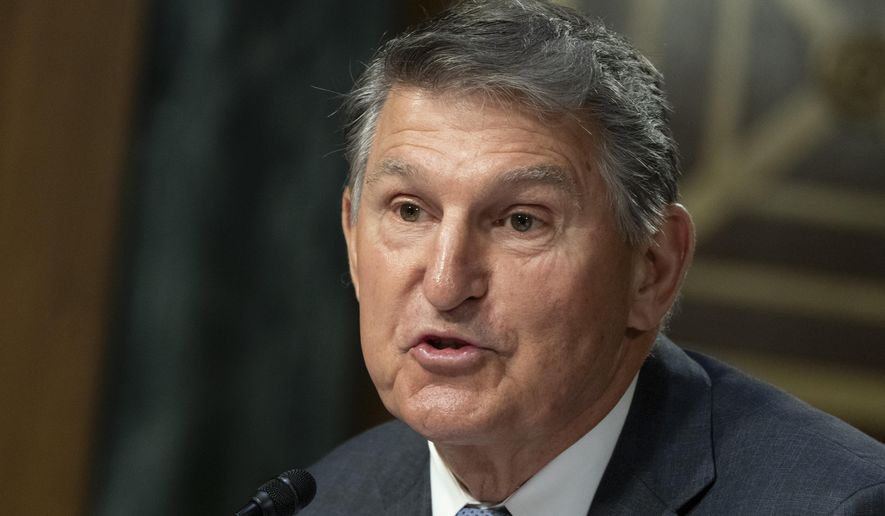Sen. Joe Manchin III single-handedly controlled the fate of the Inflation Reduction Act, the giant budget-climate law that Democrats rammed through Congress last year.
Despite the conservative West Virginia Democrat’s pivotal role, Mr. Manchin runs hot and cold on the law. He threatens to repeal his signature accomplishment some days and sings its praises other days.
This week, as the law reached the one-year mark, Mr. Manchin leaned toward praise and called it “one of the most historic pieces of legislation passed in decades for working and middle-class families.”
At the same time, Mr. Manchin said the Biden administration hijacked the law to carry out a “radical climate agenda” that ill serves his West Virginia constituents.
Mr. Manchin is emblematic of the complicated politics of the law. President Biden insists it’s paying dividends, though voters give little credit to Democrats.
The law, spanning 274 pages, included $370 billion in green energy tax benefits, government payments for prescription drugs, and corporate tax increases. The law also injected $80 billion into the IRS, which was ordered to audit more Americans.
Analysts said the law would save federal money. Democrats once called it an inflation-fighting tool — thus its cumbersome name.
That’s also why the law has been a tough sell.
“The words ‘Inflation Reduction Act’ don’t mean anything. It is provisions in the law that matter and making it relevant to groups Democrats need in particular states, especially where Senate challenges are real,” said Democratic strategist Hank Sheinkopf, whose past clients include former President Bill Clinton and former New York Mayor Michael R. Bloomberg. “Good messaging makes a clear argument that’s emotionally driven and impossible to get past. Anything you have to explain, voters just don’t have time for it. Their brains are in other places.”
Republicans gleefully point to stubbornly high inflation rates as evidence of the law’s failure.
“[Biden] claimed more spending would bring down prices. Once again, he was wrong,” said Sen. John Barrasso of Wyoming, the No. 3 Senate Republican. “Prices are still going up. Americans are facing sky-high prices at the grocery store, at the gas pump and while back-to-school shopping. They’re digging into their dwindling savings just to keep up.”
Democrats who voted for the law, particularly those from swing states, are reluctant to campaign on the Inflation Reduction Act and “Bidenomics.”
Top Democrats are aware of the headwinds.
Senate Majority Leader Charles E. Schumer prodded fellow Democrats this week to aggressively embrace the law on the campaign trail and be “persistent.” He told reporters that voters would eventually warm to the law.
“It’s going to sink in. It will take a little while. We have to be persistent at it and do it week after week,” the New York Democrat said. “We’re going to keep doing it — especially in the battleground states — week after week.”
Weak polling and a lack of understanding among voters is fueling the administration’s cross-country public relations campaign. John Podesta, a clean energy adviser to Mr. Biden, said the Inflation Reduction Act someday will be like Obamacare — a Republican political punching bag that is too popular to repeal.
Mr. Biden marked the first anniversary with a speech from the East Room of the White House. He tied the Inflation Reduction Act to his broader “Bidenomics” approach.
“Guess what, it’s working,” Mr. Biden said in a hushed tone. He credited the law with combating climate change while creating jobs. “When I think climate — not a joke — I think jobs. … I mean good-paying union jobs.”
Seven in 10 Americans responding to a recent Washington Post-University of Maryland poll said they had heard little or nothing about the law. They supported the law when prodded on specific policies, such as the green energy provisions.
The survey found that 57% disapproved of Mr. Biden’s handling of climate change, which he now says was the central thrust of the legislation.
Some liberal activists said the law fell far short of the stringent changes needed to head off a global climate catastrophe.
“It’s clear that the IRA is not enough,” Jean Su, energy justice director at the Center for Biological Diversity, said this week, pointing to record high summer temperatures.
Mr. Manchin, the linchpin in the legislative deal that allowed the bill to clear Congress, said the law has been bent too far toward global warming and away from U.S. energy production.
“Going forward, I will push back on those who seek to undermine this significant legislation for their respective political agenda, and that begins with my unrelenting fight against the Biden administration’s efforts to implement the IRA as a radical climate agenda instead of implementing the IRA that was passed into law,” he said.
Mr. Manchin, who has not announced whether he will seek reelection next year, is considered the most vulnerable senator. Republicans are eagerly using the Inflation Reduction Act against him.
One Nation, a nonprofit linked to the Mitch McConnell-connected Senate Leadership Fund super PAC, announced a six-figure digital ad buy Wednesday against Mr. Manchin.
The 30-second spot calls for Mr. Manchin to “defend our coal jobs, not D.C. liberals’ climate policy.”
• Ramsey Touchberry can be reached at rtouchberry@washingtontimes.com.




Please read our comment policy before commenting.